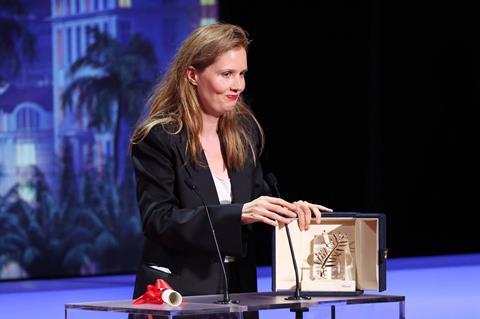
You can be too successful, as Cannes discovered in its 76th edition. You can show the best new films there are, from the Palais des Festivals right down the Croisette to Critics’ Week, making you the world’s premiere film festival.
You can process a record 14,000 accreditations to the market, bask in an eyebrow-raisingly large number of production deals (even as the writer’s strike is beginning to look like the new pandemic for production), and watch significant distribution arrangements being forged on creative titles. But the question remains: can you manage it all?
Cannes was back – artistically and commercially – in very good shape. Logistically, it wasn’t. Attendees not being able to get tickets to screenings and a generally tetchy atmosphere was a symptom, not the root of the problem itself. (Even delegate general Thierry Fremaux felt the pressure, getting into a stand-off with a policeman.)
The enduring success of the festival means it has never been more important to a global market where independent cinema is struggling: it has become a heritage site for world cinema. But it’s clear that the festival and town’s infrastructure is struggling to cope with its ambition, and that’s of growing concern, especially in a post-Covid world where the importance of preserving what we have in cinema is so clearly understood.
If these problems were a one-off – building works around the Palais involving the Cannes irrigation system didn’t help this year – or there was a feeling of reassurance, then queueing and ticketing might be less of an issue. But the messages from the Palais tend to be more defensive of today than presenting a vision of tomorrow. There’s a new president this year in the highly experienced Iris Knobloch, and the importance of ‘future-proofing’ must surely be foremost in her mind as she sets about making her mark on Cannes 77.
Fremaux has become over-identified with the festival itself, and there’s little communication of succession-management or much information beyond awarding the Palme d’Or at the end of the festival – to the third woman in 76 years, Justine Triet for Anatomy Of A Fall – and saying au revoir til 2024. As Cannes is non-profit, there may be a sense that this is an internal French issue to sort out, but in the very best way, Cannes means more to the world.
On a less lofty and on-the-ground level, queues can become very dangerous. And they shouldn’t be necessary when the event is ticketed. Leonardo DiCaprio showing up late for whatever reason, for example, wreaked havoc as the theatres are so tightly scheduled there isn’t enough time to clear the room before the next one. Logistics again.
That sense of insecurity over the future tended to overshadow delight in the present, where the selection was inspiring. The Competition wasn’t as stuffed with the ‘festival’s friends’ as it has been in the past – although they certainly made their presence felt – and new entrants made all the difference to the feeling of the line-up.
It seemed to have a more forward-thinking thrust in terms of the image even when the films, for instance from Cannes first-timer Jonathan Glazer with The Zone Of Interest, spoke of the past. Kaouther Ben Hania bent the documentary frame to her will in Four Daughters too. Yet Aki Kaurismaki, one of the elders, presented Fallen Leaves, a precious little gem of a film which topped Screen’s Cannes jury grid. And the festival ended with Ken Loach, the festival’s oldest director, making a direct – and moving – plea for future tolerance with the last film he will make.
The jury, led by Ruben Ostlund, seemed to be an unpredictable mix of personalities: overall, skewing younger and less experienced than the Competition itself. Julia Ducourau, Denis Menochet, Rungaro Nyoni, Brie Larson, Maryam Touzani, Paul Dano, Atiq Rahimi – with such disparate titles, where would they find a consensus?
In the general consensus – some of the best-reviewed titles of the festival – as it turned out, with the added bonus of awarding the Palme d’Or to Triet. Glazer won the Grand Prix, best director went to Tran Anh Hung for The Pot-Au-Feu (not the most popular with French critics admittedly), and Fallen Leaves took the Jury Prize.
Un Certain Regard this year was like unwrapping a present: the renewed focus on new directors is paying dividends as this re-establishes itself again as the most exciting zone in the Palais and not just a grab-bag of titles that didn’t fit in Competition (Cannes Premiere, meanwhile, seems to be a section purposely designed for the French exhibition sector). Molly Manning Walker’s How To Have Sex triumphed there, and justifiably so, but watch out for other titles like The Animal Kingdom, Only The River Flows and Salem to start making their way globally soon.
Directors’ Fortnight is non-competitive; in Critics’ Week Malaysian thriller Tiger Stripes won the top prize. With 23 debut films to chose from, the Camera d’Or for first feature went to Inside The Yellow Cocoon Shell, from Vietnam.
For the duration of the festival, Cannes is abuzz, its hum directing buyers, journalists, festival programmers off in hot pursuit of word of mouth: “What have you seen? What’s good?” The final word on this: festival titles which ran over three hours benefited from very little buzz, positive or negative. People didn’t have the time to see them – with the notable exception of Martin Scorsese’s Killers Of The Flower Moon, showing out of Competition, which truly started the awards race for this year.






























No comments yet